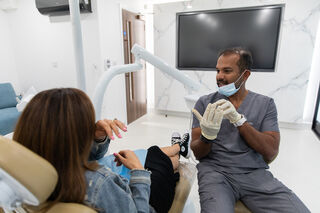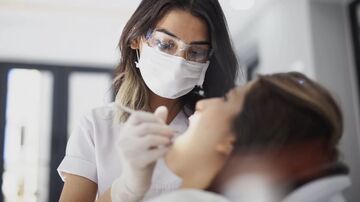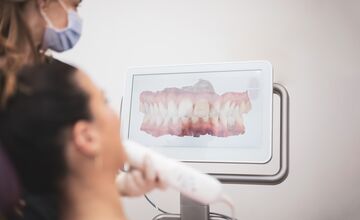
Dental Hygiene in Warwick
ABOUT OUR HYGIENE OFFERS
Benefits of dental hygiene
-
State of the art practice
-
Local independent practice
-
Highly experienced clinicians
-
Taking on new patients
Dental hygienist cleanings are growing in popularity as patients are made aware of the versatility and widespread benefits of this type of treatment. A deep cleaning will leave you with brighter teeth, fresh breath and will also protect you against common issues.
We recommend visiting the dental hygienist every 12-24 months. When combined with regular checkups, this is the best way to protect your oral health.
Why do you need dental hygiene treatments?
A dental hygienist cleaning can help to freshen your breath, keep gum disease at bay and even make your teeth appear whiter. This type of treatment will remove all surface staining, including plaque and tartar. When these are allowed to build up, they can make your teeth appear dull and discoloured, so removing them can actually make your teeth look whiter. With regular hygienist cleanings, you'll enjoy:
What happens during treatment?
A trip to the dental hygienist is quick, simple and painless. We use contact-free methods to remove plaque and tartar build-up from your teeth, so there's no need for uncomfortable scraping. Airflow polishing uses a fine stream of air, water and polishing particles to gentle remove stains from your teeth, including hard to reach areas like between teeth and below the gum line.
- Fresh breath
- Brighter, whiter teeth
- Easier to care for your teeth at home
- Expert advice on oral care
- Reduce the risk of gum disease

Contact the practice today

Dental Health Check FREE!
Claim Your Complimentary Dental Health Check Today!(Worth £85)

Related treatments
The importance of stain removal
Brushing your teeth twice a day is a great way to protect your oral health, but stains can build up over time that leave your teeth looking dull and discoloured. Plaque is a sticky substance that builds up on teeth and is very hard to remove with brushing alone. Eventually, this hardens into tartar, which is black, brown or yellow in colour. A trip to the dental hygienist will remove all traces of plaque and tartar to keep your breath fresh and your teeth looking beautiful.


Meet
our team
Get to know the team behind the treatments. We are proud to have built a team of experts and industry leaders. Meet the dental surgeons, dentists, dental nurses and support staff that will help support you on your journey to better oral health.
About the team
What to expect from your treatment journey
We want you to feel empowered and informed every step of the way. Understand what to expect during your treatment with this simple guide. Your exact treatment plan might change, but this will be explained during your consultation.

We offer direct access dental hygiene appointments, which means you don't need a dentist referral to book your appointment.
Every appointment starts with a scale and polish to deep clean your teeth and remove all traces of plaque and tartar, including in hard to reach areas such as below the gum line and between the teeth.
Our dental hygienists are oral hygiene experts and will answer any questions you might have about restorative or cosmetic procedures you might be considering.

Frequently Asked Questions
It’s common to have lots of questions about your treatment. We’ve answered some of the most popular questions below.
The simplest way to prepare is to brush and floss your teeth directly before the appointment. You should also think about any questions you would like to ask about treatments and caring for your teeth at home.
A scale and polish appointment will take around 20-30 minutes, depending on the severity of the staining. You'll also have time to ask questions about treatments and learn more about caring for your teeth at home.
Yes, it is possible to see a dental hygienist without a referral from your dentist. This is a great option for patients who have missed their checkups and are nervous about returning to the dentist.


